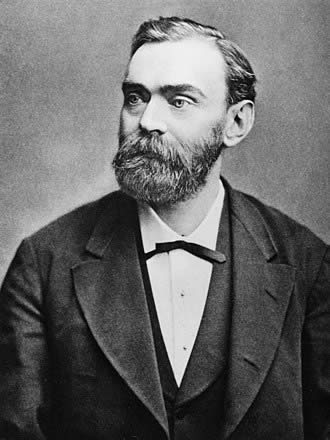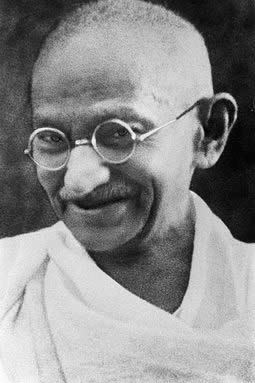Alfred Nobel: From 'merchant of death' to great Peace maker!

Alfred Bernhard Nobel. Born: 21 October 1833, Stockholm, Sweden.
- Alfred Bernhard Nobel (21 October 1833 – 10 December 1896) was a Swedish chemist, engineer, inventor, businessman, and philanthropist. He held 355 different patents, dynamite being the most famous. He owned Bofors, a major manufacturer of cannon and other armaments. Having read a premature obituary which condemned him for profiting from the sales of arms, he bequeathed his fortune to institute the Nobel Prize.
- Following various business failures, Nobel's father moved to Saint Petersburg in 1837 and grew successful there as a manufacturer of machine tools and explosives.
- His parents were able to send Nobel to private tutors and the boy excelled in his studies, particularly in chemistry and languages, achieving fluency in English, French, German and Russian.
- As a young man, Nobel studied with chemist Nikolai Zinin; then, in 1850, went to Paris to further the work. There he met Ascanio Sobrero, who had invented nitroglycerin three years before. Sobrero strongly opposed the use of nitroglycerin, as it was unpredictable, exploding when subjected to heat or pressure. But Nobel became interested in finding a way to control and use nitroglycerin as a commercially usable explosive, as it had much more power than gunpowder.
- Nobel and his parents returned to Sweden from Russia and Nobel devoted himself to the study of explosives, and especially to the safe manufacture and use of nitroglycerin. Nobel invented a detonator in 1863, and in 1865 designed the blasting cap.
- On 3 September 1864, a shed used for preparation of nitroglycerin exploded at the factory in Heleneborg, Stockholm, Sweden, killing five people, including Nobel's younger brother Emil. Dogged and unfazed by more minor accidents, Nobel went on to build further factories, focusing on improving the stability of the explosives he was developing. Nobel invented dynamite in 1867, a substance easier and safer to handle than the more unstable nitroglycerin. Dynamite was patented in the US and the UK and was used extensively in mining and the building of transport networks internationally. In 1875 Nobel invented gelignite, more stable and powerful than dynamite, and in 1887 patented ballistite, a predecessor of cordite.
- In 1888, the death of his brother Ludvig caused several newspapers to publish obituaries of Alfred in error. One French newspaper published an obituary titled "The merchant of death is dead" and went on to say, "Dr. Alfred Nobel, who became rich by finding ways to kill more people faster than ever before, died yesterday."
- Alfred (who never had a wife or children) was disappointed with what he read and concerned with how he would be remembered. Nobel was appalled at the idea that he would be remembered in this way.
- On 27 November 1895, at the Swedish-Norwegian Club in Paris, Nobel signed his last will and testament and set aside the bulk of his estate to establish the Nobel Prizes, to be awarded annually without distinction of nationality. After taxes and bequests to individuals, Nobel allocated 94% of his total assets, to establish the five Nobel Prizes. In 2012, the capital was worth around US$472 million or EUR 337 million.

The Norwegian Nobel Committee declined to award Nobel Peace prize in 1948, the year of Gandhi's death, on the grounds that "there was no suitable living candidate."
- The first three of these prizes are awarded for eminence in physical science, in chemistry and in medical science or physiology; the fourth is for literary work "in an ideal direction" and the fifth prize is to be given to the person or society that renders the greatest service to the cause of international fraternity, in the suppression or reduction of standing armies, or in the establishment or furtherance of peace congresses.
- The formulation for the literary prize being given for a work "in an ideal direction", is cryptic and has caused much confusion. For many years, the Swedish Academy interpreted "ideal" as "idealistic" and used it as a reason not to give the prize to important but less romantic authors, such as Leo Tolstoy and Henrik Ibsen. This interpretation has been revised subsequently.
- Nobel was Lutheran and regularly attended the Church of Sweden Abroad during his Paris years, led by pastor Nathan Söderblom who received the Nobel Peace Prize in 1930.
- He remained unmarried. His biographers note that he had three loves, the first in Russia with a girl named Alexandra who rejected his proposal. In 1876, Austro-Bohemian Countess Bertha Kinsky became his secretary, but she left him after a brief stay to marry her previous lover. Her contact with Nobel was brief, yet she corresponded with him until his death in 1896. It is believed that she was a major influence in his decision to include a peace prize in his will. She was awarded the 1905 Nobel Peace prize "for her sincere peace activities".
|